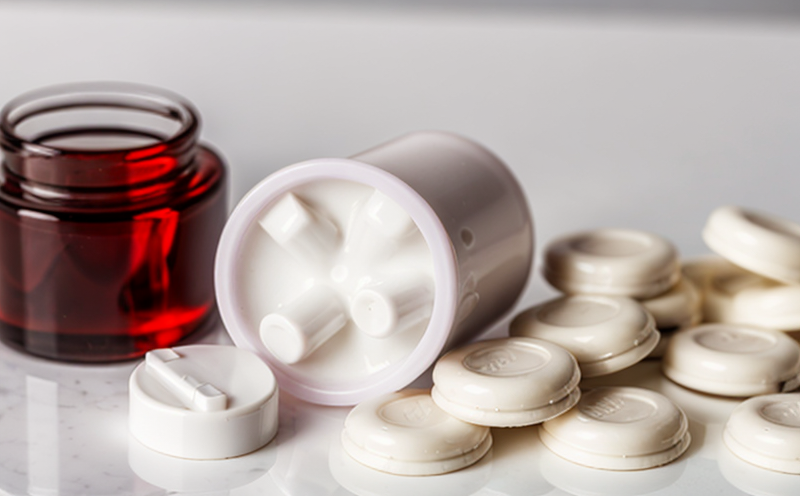USP Capsule Shell Stability Testing
The USP Capsule Shell Stability Test is an essential procedure ensuring that pharmaceutical products meet the highest standards of quality and stability. This test evaluates whether capsule shells, a critical component in oral solid dosage forms, remain intact under specified environmental conditions over time. It ensures that capsules maintain their integrity to protect drug content from degradation or contamination, thereby safeguarding patient safety.
The USP Capsule Shell Stability Test is governed by United States Pharmacopeia (USP) General Chapter General Chapter 710. This chapter outlines the parameters for testing to ensure that capsule shells comply with USP standards. The test is crucial in pharmaceutical manufacturing as it helps in selecting appropriate shell types and ensuring they meet stability requirements.
The test involves exposing capsule shells to various environmental stresses, including temperature, humidity, light exposure, and accelerated aging conditions. These stresses simulate real-world storage and handling conditions that the capsules might encounter throughout their shelf life. The objective is to determine if the capsule shells can withstand these stresses without compromising the quality or integrity of the drug product.
During testing, samples are subjected to controlled conditions for a specified duration. For instance, exposure to high humidity (90% RH) at 25°C for 14 days simulates storage in humid environments common in tropical regions. Another scenario involves exposing samples to light with an intensity of 3,600 lux for 6 months, which mimics the effects of prolonged sunlight on packaging materials.
The results from these tests are crucial for quality assurance and compliance. They inform decisions about capsule shell selection, formulation adjustments, and potential changes in manufacturing processes or storage conditions to maintain product stability. By conducting this test, pharmaceutical companies can ensure that their products meet not only USP standards but also international regulatory requirements.
Understanding the importance of this test is paramount for quality managers and compliance officers. It ensures that the final product meets stringent quality criteria, thereby enhancing patient trust in pharmaceutical products. For R&D engineers and procurement professionals, this test provides critical insights into material properties and potential areas for improvement.
Scope and Methodology
The USP Capsule Shell Stability Test encompasses a series of procedures designed to evaluate the integrity and stability of capsule shells under specified conditions. The primary scope includes assessing the physical, chemical, and mechanical properties of capsule shells over time.
- Physical Integrity: This involves checking for any visible signs of damage or degradation in the shell's appearance.
- Chemical Stability: Evaluating changes in shell composition to ensure they do not affect drug stability.
- Mechanical Strength: Testing the shell’s resistance to mechanical stress, including compression and flexibility.
The methodology typically involves exposing capsule shells to different environmental conditions for a defined period. These conditions are designed to simulate real-world storage scenarios that might impact capsule integrity. The test parameters include temperature, humidity, light exposure, and accelerated aging techniques.
For the actual testing process, we use advanced equipment such as climate chambers capable of precise control over temperature and humidity levels. Light boxes provide controlled exposure to UV light, while aging ovens simulate long-term storage under high temperatures. After exposure to these conditions, samples are visually inspected for any changes in appearance or structural integrity.
Chemical analysis may also be conducted using spectroscopy techniques to assess any alterations in the chemical composition of the shell. Mechanical tests measure the force required to compress or bend the capsule, providing insights into its durability and flexibility. These comprehensive evaluations ensure that capsule shells meet all USP specifications for stability and integrity.
Eurolab Advantages
At Eurolab, we pride ourselves on offering cutting-edge services tailored to meet the stringent requirements of pharmaceutical testing. Our expertise in conducting USP Capsule Shell Stability Testing sets us apart as a trusted partner for quality assurance and compliance.
- Comprehensive Expertise: Our team comprises seasoned professionals with deep knowledge in pharmaceutical sciences, ensuring accurate and reliable test results.
- State-of-the-Art Facilities: We are equipped with the latest climate chambers, light boxes, and aging ovens to simulate real-world storage conditions accurately.
- ISO 17025 Accreditation: Our laboratory is ISO 17025 accredited, ensuring that our tests meet international standards for accuracy and reliability.
- Comprehensive Reporting: We provide detailed reports with actionable insights, helping clients make informed decisions about their manufacturing processes.
Beyond technical proficiency, Eurolab offers unparalleled support in navigating complex regulatory landscapes. Our compliance officers are well-versed in international standards such as USP General Chapter 710 and can help pharmaceutical companies stay compliant with global regulations.
Our commitment to excellence extends beyond just conducting tests; we offer comprehensive solutions that include formulation development, stability studies, and lifecycle management strategies. By choosing Eurolab for your USP Capsule Shell Stability Testing needs, you ensure that your products meet the highest quality standards and are trusted by regulatory bodies worldwide.
International Acceptance and Recognition
- The USP Capsule Shell Stability Test is widely recognized across various countries for its stringent criteria and comprehensive evaluation of capsule integrity.
- This test is not only accepted in the United States but also by regulatory authorities in Europe, Asia, and other regions. For instance, the European Pharmacopoeia (Ph Eur) and the Japanese Pharmacopeia (JP) reference USP General Chapter 710 for capsule shell stability testing.
The International Conference on Harmonisation of Technical Requirements for Pharmaceuticals for Human Use (ICH), which comprises regulatory agencies from Japan, Europe, and the United States, also endorses this test. This harmonization ensures that pharmaceutical products meet consistent quality standards globally.
Pharmaceutical companies aiming to export their products internationally must comply with these stringent tests. Compliance with USP Capsule Shell Stability Testing not only enhances market access but also builds trust among international regulatory bodies and consumers.





